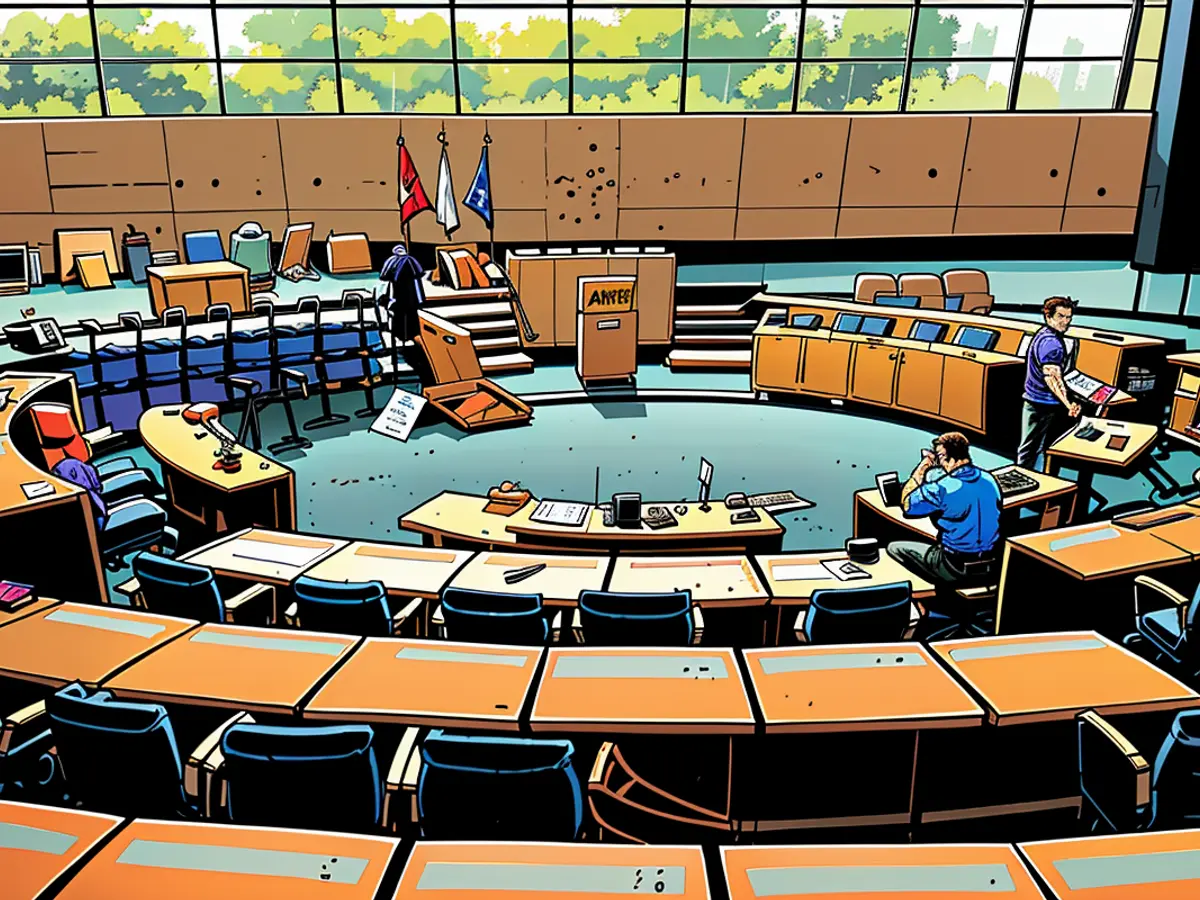The Political Drama Unfolds in Erfurt
After about four weeks since the election, the Thuringian state parliament will convene. For the first time, the Alternative for Germany (AfD) is the dominant force, testing traditional political norms. The stage is set for a legal showdown, potentially turning a once-formal procedure into a spectacle.
The anticipated political drama could foreshadow the contest for the state's minister-president. Nearly a month post the state election, the parliament in Erfurt is set to commence its operations (noon start) - including the election of a parliament speaker. Historically, this has been a simple process, with the leading faction putting forth a neutral candidate accepted by many. However, this time, tensions are high. This time, it's a power struggle between the dominant AfD faction, led by its controversial leader Björn Höcke, and the remaining four factions: CDU, BSW, Left, and SPD. This time, it's about political strategizing and possible manipulations.
The Setting
Following the election results, the prevailing faction is entitled to propose a candidate for the presidency, which carries significant decision-making powers. In Thuringia, the AfD is by far the largest faction, holding 32 out of 88 seats. The party has chosen its MP, Wiebke Muhsal, as a candidate.
The 38-year-old mother of four hails from North Rhine-Westphalia and settled in Thuringia after her studies. She served as a parliament member from 2014 to 2019 and gathered attention for various reasons, including her one-time appearance in parliament dressed in a niqab. Muhsal was convicted of fraud and fined €8,000 after falsifying an employment contract with a staff member in 2014 to secure additional funds from the parliament administration. Some view the AfD's personnel selection as a provocation. "An individual who embezzles public funds should not become speaker of the parliament," remarks the incumbent minister-president, Bodo Ramelow.
Even before Muhsal's candidacy was announced, the CDU, BSW, and SPD had declared that they would not support anyone with an AfD party membership as electable. The speaker of the parliament, serving as the "protector of the constitution and parliamentarism" in Thuringia, should not hail from a party classified as extremist and under observation by the state's Office for the Protection of the Constitution, argued CDU's parliamentary group leader Mario Voigt repeatedly.
The CDU is rallying behind its MP, Thadäus König, who defeated Höcke in the 2019 state election and clinched the direct mandate in the predominantly Catholic Eichsfeld region. König holds the vice-chairmanship and defended his direct mandate with an impressive first-vote result of 54.3 percent. Höcke, in turn, shifted his base to a constituency at the other end of the state and lost there as well to the CDU candidate.
The Struggle
Despite the AfD's insistence on its right to propose a candidate, political scientist André Brodocz from Erfurt deems the AfD's accusations of undemocratic actions by other parties as unfounded. The Federal Constitutional Court recently ruled in similar cases, he explains, "that the right to propose a candidate is not contingent upon election results." Brodocz emphasizes, "The election is the fundamental democratic mechanism."
What happens if the AfD candidate doesn't secure a majority? According to the state administration, the right of the leading fraction to propose candidates dissolves once asked, and after two successive failures, other factions may nominate candidates. However, the AfD maintains a different interpretation, believing only the AfD can put forward proposals.
The parliamentary manager of the AfD, Torben Braga, did not dismiss the prospect of compromise offers from the party the day before the first session. However, he expresses optimism that a resolution will be reached. "There are opportunities for compromise." Braga, unspecific about the nature of prospective compromises, ruled out proposing all AfD members in case of an unsuccessful presidential election for the AfD. "The AfD does not intend to propose all its members for election."
The state administration maintains that neither the state constitution nor the parliamentary rules of procedure suggest a "permanent exclusive right of proposal for the leading faction, thereby implying that all faction members must be proposed for election before the parliament could explore other alternatives."
The perceived escape hatch
In an attempt to avoid potential conflicts, the CDU and BSW are seeking to adjust the parliament's rules of procedure before the election of the parliamentarian president. This change is also on the agenda of the first session. The plan is to allow other factions to propose candidates from the first ballot onward. The AfD reacts with shock, and its leader Höcke levies harsh criticism: "It is unfathomable with what political trickery the established parties intend to invalidate the election results and the parliamentary participation of a third of the Thuringian electorate," the 52-year-old wrote on X. Höcke accuses "shredding the democratic culture," in which even the newly established Wagenknecht party is involved.
The primary advantage for the Alternative for Germany (AfD) lies in the elder statesman, Jürgen Treutler. This 73-year-old engineer hails from South Thuringia and will preside over the initial meeting of the newly elected parliament as its oldest leader. As per AfD co-chair Stefan Möller, the elder president holds exclusive authority in interpreting the rules of procedure and directing the parliamentary proceedings in the opening session. Treutler has been cryptic about his plans, responding, "You'll have to wait and see."
Other political parties have expressed concern that Treutler might manipulate the scenario by demanding new voting rounds with AfD candidates, exploiting his resolution over the rules, and disregarding candidates from rival factions. This is why the Christian Democratic Union (CDU) and Christian Social Union (CSU) are striving to clarify the rules further to prevent any potential legal clash during the inaugural session.
There seems to be a disagreement regarding the parliament's ability to modify its rules prior to its official formation. Stefan Möller believes that the parliament remains incapable of altering the rules until it has been formally convened. The Thuringian parliamentary administration has, however, countered this perspective, stating that the parliament can revise its procedures after it has commenced, citing its authority to self-organize. Treutler has hinted at tumultuous proceedings in the first session depending on the nature of potential objections.
In the event that Treutler resists the voting on the procedural rules, resurrecting the Thuringian Constitutional Court might be necessary. The court has disclosed its readiness to offer an expedient resolution. Treutler also commented on the potential significance of the parliamentary agenda, predicting that any attempts to modify it could change the electoral dynamics in his favor, benefiting the AfD in subsequent elections.
Can the initial session be postponed?
According to the Thuringian parliamentary administration, only a temporary suspension of the session is feasible, with the assembly subsequently reconvening at a later juncture. The parliament would then transition into a "constitution phase" – a scenario without any precedent in the Federal Republic.
What implications does this have on the election of the Minister-President?
Unlike many other federal states, Thuringia lacks a designated timeframe for the election of a new Minister-President. Article 75, paragraph 3 of the state constitution permits the incumbent Minister-President and the entire state government to carry out their duties temporarily until their replacements assume office. As a consequence, Bodo Ramelow, the current head of government and a member of the Left party, along with his red-red-green coalition, would maintain their positions in an acting capacity. However, the political scenario following the election could grow more intricate.
The Commission, in line with the given Regulation, may adopt implementing acts to outline the specific application rules. In this context, the Thuringian parliament's rules of procedure could be amended to allow for the proposal of candidates from other factions during the election of the parliamentarian president, potentially delaying the formal proceedings.









